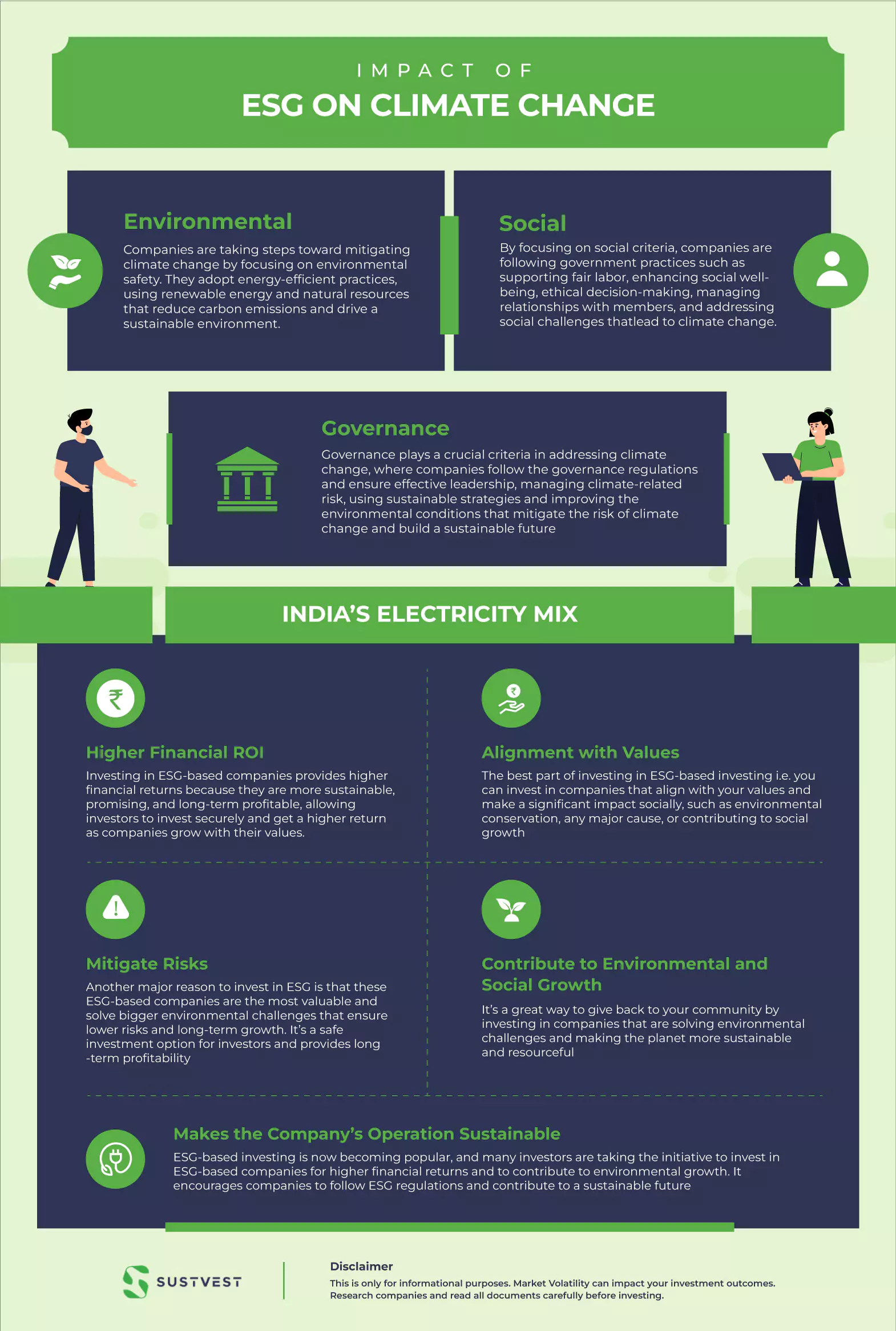As the world continuously grows, the global challenges are becoming more visible.
According to the World Meteorological Organization, there’s a 50-50 chance of the annual average global temperature reaching 1.5°C in the next five years.
Now governments and companies recognize the importance of resolving climate risks and focusing on environmental, social, and governance (ESG) stability. As a result, ESG investment has rapidly grown to address climate change.
So if you’re an investor, ESG plays a crucial factor for making investment decisions. At SustVest, we are committed to guiding you towards making choices that align with both your values and financial goals.
In this article, we will look in-depth at Environmental, Social, and Governance (ESG), how it impacts climate change, what is the critical significance of ESG in finance, ESG benefits and why invest in ESG.
Let’s dive in to gain a comprehensive understanding of the effects of ESG and its significance in addressing climate change.

What is Environmental, Social, and Governance (ESG)?
Environmental, Social, and Governance (ESG) is a framework used to evaluate the sustainability and practices of organizations and investments. It’s like criteria that companies follow to ensure the safety of the environment, social, and governance criteria.
Let’s understand the three important aspects that ESG encompasses :
Environmental criteria, where companies ensure their safety for the environment and address various challenges such as climate change. It’s all about promoting sustainable practices and minimizing harm to our planet.
Social criteria, where they manage relationships with employees, suppliers, and customers. It’s about building strong relationships and making a positive impact on society.
At last, Governance criteria, where companies deal with their leadership, stakeholders, audits, operations, and more for responsible decision-making.
Every investor should have a clear understanding of it as it is the most important factor. However, before investing in any company, they must ensure that they invest in companies that follow the ESG criteria.
Read here to know: Is ESG Applicable In India and How ESG Investing in India Works?
Impact of ESG on Climate Change

Our world faces various global challenges, and climate change is one of the major ones. With increasing inequality and balancing economic and environmental safety needs, the government and investors are now focusing on addressing climate change.
This is where the demand for ESG increases for companies to mitigate the effects of climate change and create a sustainable future. So if you’re confused about how ESG in finance plays a crucial role and why invest in ESG?
There are three key areas in ESG: Environmental, Social, and Governance. When companies follow these criteria, they contribute to a sustainable future.
Let’s see how!
1. Environmental: Companies are taking steps toward mitigating climate change by focusing on environmental safety. They adopt energy-efficient practices, using renewable energy and natural resources that reduce carbon emissions and drive a sustainable environment.
2. Social: By focusing on social criteria, companies are following government practices such as supporting fair labor, enhancing social well-being, ethical decision-making, managing relationships with members, and addressing social challenges that lead to climate change.
3. Governance: Governance plays a crucial criteria in addressing climate change, where companies follow the governance regulations and ensure effective leadership, managing climate-related risk, using sustainable strategies and improving the environmental conditions that mitigate the risk of climate change and build a sustainable future.
That’s why you should invest in ESG because it’s an essential framework that every company must follow to drive a sustainable future. It brings a positive impact on the environment and economy.
ESG Regulations and Compliances in India
In an era where sustainable practices are gaining global significance, India has embarked on a transformative journey towards Environmental, Social, and Governance (ESG) regulations and compliances. ESG Regulations and Compliances help to build a sustainable future and allow companies to work with the best sustainable practices.
There are various ESG regulations and compliances that most companies consider in their operations.
Here are some of the most important ESG regulations and compliances:
- In 2009, the National Voluntary Guidelines (NVGs) issued by the Ministry of Corporate Affairs (MCA) proved India’s faster adoption of corporate responsibilities. It started with the aim for companies to drive profit and social goods.
- In 2012, the SEBI mandated that the top 100 companies, as per market capitalization, file Business Responsibility Reporting (BRR) and annual reports.
- In 2013, The Companies Act introduced ESG disclosure requirements for companies. According to Section 134(m), companies must include a report by the Board of Directors (BODs) on the conservation of energy in their annual financial statements. Later, it was further detailed under CSR Rule 8(3)(A) of the company’s accounts rules in 2014.
- In 2015, the Securities and Exchange Board of India (SEBI) expanded its requirements for Business Responsibility Reporting (BRR) to the top 500 companies as per market capitalization.
- In 2016, the RBI mandated all banks to conduct environmental and social impact assessments (ESIA) for all new projects, and it ensured that banks looked at environmental and social impact before financing any projects.
- In 2017, the SEBI advised that Integrated Reporting (IR) should be adopted by the top 500 companies voluntarily, starting with the financial year 2017-18.
- In 2018, SEBI issued guidelines for mutual funds to integrate ESG factors into their investment decisions. To spread awareness about investing in companies that drive financial and social returns.
- In 2019, the Ministry of Corporate Affairs (MCA) released the National Guidelines on Business Responsibility and Sustainability Reporting (NGBRC) to mandate companies to provide detailed reports on their business responsibility and sustainability practices.
- Additionally, the SBI extended the requirement of BRR to the top 1,000 companies as per market capitalization.
- In 2020, the Ministry of Environment, Forest, and Climate Change (MoEFCC) introduced the ECO Niwas Samhita, which set guidelines for energy-efficient residential buildings to reduce greenhouse gas emissions. It shows the country’s growth and commitment to sustainability.
- In 2021, SEBI introduced the BRSR framework, which replaced the earliest BRR framework. It helps to enhance the disclosure and reporting of ESG-related information, and the top 1,000 companies must disclose ESG reports for the financial year 2022-23.
- In 2022, India was the first jurisdiction to take forward draft regulation in the ESG rating market.
- SEBI has also proposed a new disclosure on the no. of engagements conducted by fund managers, engagement approach, and outcomes, which will be implemented in 2024-25.
India is moving towards ESG Sustainability, and these regulations and compliances for companies help to make a sustainable future. It gives various investors a reason to invest in ESG to get financial and social returns along with their values.
Read More: Is It worth Investing In Environmental Sustainability?
If you’re an investor looking for long-term profitability options, ESG investing can be a good option in today’s fast-paced world.
Still, the question arises,
Why Invest in ESG?
With increased focus on a sustainable future, the regulations and compliances in ESG have become mandatory for companies. The market has shifted to invest in those companies producing financial and social returns to build a sustainable future.
Here are some key reasons to invest in ESG:
1. Higher Financial ROI
Investing in ESG-based companies provides higher financial returns because they are more sustainable, promising, and long-term profitable, allowing investors to invest securely and get a higher return as companies grow with their values.
These companies are making a social impact, addressing environmental challenges, and generating financial returns. So investing in ESG-based companies can yield higher returns with long-term profitability.
2. Alignment with Values
The best part of investing in ESG-based investing i.e. you can invest in companies that align with your values and make a significant impact socially, such as environmental conservation, any major cause, or contributing to social growth. Then it becomes easier and more beneficial for investors to invest in getting returns and contributing to society.
3. Contribute to Environmental and Social Growth
It’s a great way to give back to your community by investing in companies that are solving environmental challenges and making the planet more sustainable and resourceful. It also encourages or inspires other investors to take the initiative and invest in social goods.
4. Mitigate Risks
Another major reason to invest in ESG is that these ESG-based companies are the most valuable and solve bigger environmental challenges that ensure lower risks and long-term growth. It’s a safe investment option for investors and provides long-term profitability. Investing in various ESG-based companies can allow investors to mitigate risk, diversify portfolios, and get higher returns.
5. Makes the Company’s Operation Sustainable
ESG-based investing is now becoming popular, and many investors are taking the initiative to invest in ESG-based companies for higher financial returns and to contribute to environmental growth. It encourages companies to follow ESG regulations and contribute to a sustainable future. It’s an effective way to support and promote this initiative and build a sustainable ecosystem.
These are some major reasons for investors why to invest in ESG and the benefits of ESG investing.
ESG Benchmarking
ESG benchmarking involves evaluating and comparing a company’s performance in Environmental, Social, and Governance (ESG) criteria against industry standards. It serves as a tool to measure a company’s sustainability efforts, ethical practices, and overall ESG performance relative to peers, enabling investors to make informed decisions based on ESG factors. Benchmarking helps assess the effectiveness of a company’s ESG initiatives and identifies areas for improvement, fostering transparency and accountability in sustainable investing.
Check Out: What Is ESG Investing? List Of ESG Funds Available In India
FAQs: Environmental, Social and Governance (ESG)
How Does ESG Affect Climate Change?
Environmental, Social, and Governance (ESG) is a great tool to promote a sustainable future by resolving environmental challenges and fostering social growth.
What are the Major ESG Risks?
Some of the most common ESG risks include climate change, carbon footprints, waste resources, deforestation, and greenhouse gas emissions.
Conclusion
Overall, ESG is crucial to addressing environmental challenges such as climate change. Now companies, investors, and governments are taking initiatives to promote ESG-based investing so that companies can address social challenges and build a sustainable future. We hope this article helps you learn everything about ESG, its benefits, and why invest in ESG.
For investors, ESG benchmarking is one of the essential factors that they should consider while making investment decisions to ensure lower risk, higher returns, and long-term profitability.
So, if you’re planning to start investing in ESG-based companies, then SustVest will help you start your investing journey and get positive financial and social returns that align with your values. Click here to invest for a better future.

Founder of Sustvest
Hardik completed his B.Tech from BITS Pilani. Keeping the current global scenario, the growth of renewable energy in mind, and people looking for investment opportunities in mind he founded SustVest ( formerly, Solar Grid X ) in 2018. This venture led him to achieve the ‘Emerging Fintech Talent of the Year in MENA region ‘ in October 2019.




